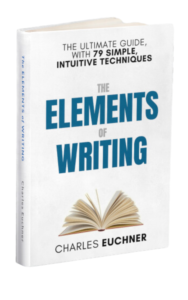The first time I published an article in my college paper, I asked a senior editor to give me a critique. I was expecting a pat on the back for a job well done. But I got a tear sheet* filled with red ink.
If you give a piece of writing to a friend or colleague, you will be lucky if you get the same treatment. You should always be open to critiques, of everything: the focus of the piece, the organization, the style, the evidence, and more.
But we writers are a sensitive lot. When we write, we put down not only what we know at the start, but also ideas sparked by the writing process. So writing takes on a life of its own. We often labor in isolation and get lost in our own world. Because we get lost, creatively, we lose perspective.
But don’t count on friends and colleagues to offer good critiques and feedback.
Most people, when asked to read a friend’s work, want to be nice. Even if the writing bores them or confuses them, they will not say it. They will look for something nice to say.
“Great topic.”
“You know, I didn’t know that…”
“It was interesting the way you tied together those two events…”
Even your most critical readers will still avoid a real critique. Not just because they are sensitive to your feelings but because critical reading is a hard and laborious task. So if you press them, they’ll find a couple of nits to pick but avoid the big issues.
I have worked with writers in a wide range of settings: newspapers and magazines, government, websites, think tanks, and book publishing. Many of the people in these settings are open to critiques. They are grateful for any ideas you might offer about making copy more clear and energetic. But some resist.
“But that’s my style…”
“No one ever said that was a problem…”
“We always do it that way…”
Some sensitive types protest vehemently. They are (to use the word in vogue) triggered by any and all criticism.
This kind of resistance increases the chance that, next time, the critique will be softer. Rather than battle a sensitive writer, even determined editors give way. Why hassle?
Even if you want a real critique, then, you often get the most general praise or meaningless nit-picking.
How do you get past the politesse and avoidance of friends and colleagues? If you want to get better, find someone who will read your work thoroughly and respond honestly and specifically. Ask them to critique:
- How clearly you state a controlling idea and build the piece around that controlling idea. (See my discussion of “The One Idea” here.)
- How clearly you write every sentence and paragraph. Every sentence should state the idea right away, with specific subjects and active verbs. Every paragraph should state and develop a single idea.
- How well you stay on the right track–and how well you get back non track after a necessary diversion.
- How well you highlight different sections of the piece with subheads.
- How convincingly do you make your points, with specific data and other evidence that speaks directly to your points.
- Where you make spelling and grammar mistakes.
Ask them to mark the sections clearly. Get them to underline or put brackets around specific passages. Specificity is the key. You need to know exactly when and where you go wrong.
Find the people who will be honest and show them your appreciation, however you can.
As for your friends and family? Appreciate their support but don’t count on them for any meaningful critiques.
•
*The term tear sheet comes from advertising. It refers to a page torn from a periodical to show proof that the ad had been published.


